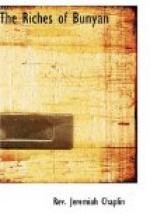It may be doubted whether any English dissenter had suffered more severely under the penal laws than John Bunyan. Of the twenty-seven years which had elapsed since the Restoration, he had passed twelve in confinement. He still persisted in preaching; but that he might preach, he was under the necessity of disguising himself like a carter. He was often introduced into meetings through back doors with a smockfrock on his back, and a whip in his hand. If he had thought only of his own ease and safety, he would have hailed the indulgence with delight. He was now at length free to pray and exhort in open day. His congregation rapidly increased; thousands hung upon his words; and at Bedford, where he ordinarily resided, money was plentifully contributed to build a meeting-house for him. His influence among the common people was such that the government would willingly have bestowed on him some municipal office; but his vigorous understanding and his stout English heart were proof against all delusion and all temptation. He felt assured that the proffered toleration was merely a bait intended to lure the Puritan party to destruction; nor would he, by accepting a place for which he was not legally qualified, recognize the validity of the dispensing power. One of the last acts of his virtuous life was to decline an interview to which he was invited by an agent Of the government. T. B. Macaulay—History of England.
The demeanor of Sir Matthew Hale in the case of John Bunyan, the author of the Pilgrim’s Progress, shows him paying respect both to the rules of law and to the dictates of humanity. This wonderful man—who, though bred a tinker, showed a genius little inferior to that of Dante—having been illegally convicted by the court of Quarter-sessions, was lying in prison under his sentence in the jail of Bedford. Soon after the restoration of Charles II., the young enthusiast had been arrested while he was preaching at a meeting in a private house; and, refusing to enter into an engagement that he would preach no more, had been indicted as “a person who devilishly and perniciously abstained from coming to church to hear divine service, and a common upholder of unlawful meetings and conventicles, to the great disturbance and distraction of the good subjects of this realm.”
Little do we know what is for our permanent good. Had Bunyan then been discharged and allowed to enjoy liberty, he no doubt would have returned to his trade, filling up his intervals of leisure with field-preaching; his name would not have survived his own generation, and he could have done little for the religious improvement of mankind. The prison-doors were shut upon him for twelve years. Being cut off from the external world, he communed with his own soul; and inspired by Him who touched Isaiah’s hallowed lips with fire, he composed the noblest of allegories, the merit of which was first discovered by the lowly, but which is now lauded by the most refined critics, and which has done more to awaken piety and to enforce the precepts of Christian morality, than all the sermons that have been published by all the prelates of the Anglican church. Lord Campbell.




